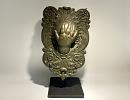Contact Seller
Brian Knapp Antiques
Tel07852356521Please quote Antiques Atlas.


 Royal Hereford City Coat Of Arms Plaque
Royal Hereford City Coat Of Arms Plaque
 Antique Cast Iron Royal Coat Of Arms
Antique Cast Iron Royal Coat Of Arms
 Circa 1800 Armorial Crest Coat Of Arms Lion
Circa 1800 Armorial Crest Coat Of Arms Lion
 British Royal Coat of Arms Wall Plaque
British Royal Coat of Arms Wall Plaque
 Coat of Arms from Borough of Finchley
Coat of Arms from Borough of Finchley
 Wall Hanging Victorian Cast Iron Royal Coat of Arm
Wall Hanging Victorian Cast Iron Royal Coat of Arm
 Imperial Prussian Pikelhaube Helmet Plate
Imperial Prussian Pikelhaube Helmet Plate
 Large Hand Carved British Royal Coat of Arms Brewe
Large Hand Carved British Royal Coat of Arms Brewe
 19th Century Shield
19th Century Shield
 Royal Circa 1707-14 Armorial Crest Coat Of Arms
Royal Circa 1707-14 Armorial Crest Coat Of Arms
 King George III 1738-1820 Royal Coat Of Arms
King George III 1738-1820 Royal Coat Of Arms
 Victorian Hand Carved Wall Plaque Coat Of Arms
Victorian Hand Carved Wall Plaque Coat Of Arms
Non UK callers :
+44 7852356521
Lord Chancellors Burse


This burse was made to carry the Great Seal of the Realm. We believe it dates to the mid- nineteenth century. Parliamentary historian Dr. Mark Collins has suggested, “it is older than Victorian, with the winged cherubs and the overall design being reminiscent of the late 17th C and English Baroque. Further to this, from the images you sent, the cipher could well read ‘I R’, in other words ‘Iacobus Rex’ or King James II. (r. 1603-1701) If so, it could have been the burse used by Sir Francis North or Lord Jeffreys.” The design is thought to have originated during the early seventeenth century as burses of nearly identical format appear in portraits of the Lord High Chancellors of England well into the nineteenth century. Obviously designed to impress, this richly embroidered burse (purse) was made to contain and protect the Great Seal. It was intended to be both practical and symbolic, an important example of the paraphernalia of State. The Lord Chancellor’s burse historically contained the Great Seal of the Realm and is carried during processions for state occasions (by the Purse bearer). Traditionally it is carried into the Chamber as part of the procession for the State Opening of Parliament and is used to carry the King or Queen’s Speech. The burse is worked in metal-thread and coloured threads, against a burgundy velvet background, edged with metal thread, applied with four tassels and ribbon through the top eyelets, displaying the royal arms and insignia and incorporating the letters ‘IR’, or ‘VR’. The crest shows a crown and crowned lion, between two embroidered ovals with flowers, a lion and a unicorn support the shield, showing the three passant guardant lions of England, the rampant lion of Scotland and the harp of Ireland, which is circled by the emblem of the Order of the Garter: reading Honi soit qui mal y pense (May he be shamed who thinks badly of it). Below is the motto of English monarchs: Dieu et mon Droit (God and my Right), the reverse is plain burgundy velvet, now mounted on an upholstered fabric board. One of the earliest surviving examples, used during the reign of Queen Elizabeth I (r. 1558 – 1603, England. Museum no. T.40-1986. Is found at the © Victoria and Albert Museum, London. The British Museum Registration number 1997,0301.1. While other examples can be found in the collections of The Metropolitan Museum New York, Accession Number: 64.101.1363, the Ashmolean Museum in Oxford, the National Trust and Lincoln Inn.
PriceSOLD
DimensionsOverall: Height 63cm X Width 55cm X Depth 5cm. Mounted on Fabric Backed panel. (Unframed)
Category Antique Arms and Militaria
Date Mid 19th Century
Early Victorian Antiques Material Silk
Origin English
Condition Good , wear as expected with age
Item code as1221a014 / 0035
Status Sold
SellerBrian Knapp Antiques
View all stock from
Brian Knapp Antiques

 Private dealer
Private dealer
By appointment only
Blockley, Moreton-in-Marsh
Gloucestershire, England
Tel : 07852356521
Non UK callers : +44 7852356521
View all stock from
Brian Knapp Antiques

 Private dealer
Private dealerBy appointment only
Blockley, Moreton-in-Marsh
Gloucestershire, England
Tel : 07852356521
Non UK callers : +44 7852356521
You may also be interested in
 Royal Hereford City Coat Of Arms Plaque
Royal Hereford City Coat Of Arms Plaque
 Antique Cast Iron Royal Coat Of Arms
Antique Cast Iron Royal Coat Of Arms
 Circa 1800 Armorial Crest Coat Of Arms Lion
Circa 1800 Armorial Crest Coat Of Arms Lion
 British Royal Coat of Arms Wall Plaque
British Royal Coat of Arms Wall Plaque
 Coat of Arms from Borough of Finchley
Coat of Arms from Borough of Finchley
 Wall Hanging Victorian Cast Iron Royal Coat of Arm
Wall Hanging Victorian Cast Iron Royal Coat of Arm
 Imperial Prussian Pikelhaube Helmet Plate
Imperial Prussian Pikelhaube Helmet Plate
 Large Hand Carved British Royal Coat of Arms Brewe
Large Hand Carved British Royal Coat of Arms Brewe
 19th Century Shield
19th Century Shield
 Royal Circa 1707-14 Armorial Crest Coat Of Arms
Royal Circa 1707-14 Armorial Crest Coat Of Arms
 King George III 1738-1820 Royal Coat Of Arms
King George III 1738-1820 Royal Coat Of Arms
 Victorian Hand Carved Wall Plaque Coat Of Arms
Victorian Hand Carved Wall Plaque Coat Of Arms







